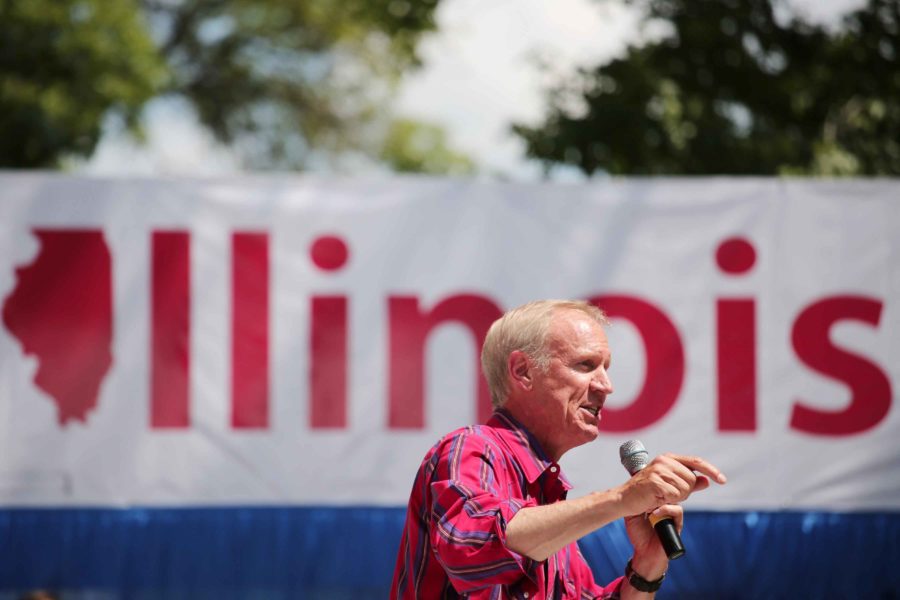Opinion: The up-and-down week of stubborn Gov. Bruce Rauner
Illinois Gov. Bruce Rauner speaks at the Illinois State Fair on Aug. 17, 2016, in Springfield. (Anthony Souffle/Chicago Tribune/TNS)
November 20, 2016
In some ways, Gov. Bruce Rauner had a pretty good week.
Illinois’ senior U.S. Sen. Dick Durbin, widely seen as the most formidable opponent for Rauner if, as expected, he runs for re-election in 2018, hung on to his leadership position in Washington and formally ruled out a gubernatorial bid Wednesday. When Democrats failed to win control of the Senate in the Nov. 8 election, speculation had increased that Durbin would challenge Rauner rather than slog along whipping votes for a minority caucus that can do little now but obstruct legislation.
But that prospect evidently looks a lot more pleasant than entering a very expensive and inevitably very nasty race for the right to preside over a state in deep crisis. Go figure. Durbin’s withdrawal leaves no obvious Democratic front-runner and foretells a fractious and costly primary fight.
Advertisement
Meanwhile, the Illinois Labor Relations Board handed Rauner a victory in his nearly 17-month standoff with the American Federation of State, County and Municipal Employees, the state’s largest public employee union. The ruling, released Tuesday, declared that contract negotiations had reached a formal impasse, which gave Rauner the option of unilaterally imposing terms on the union.
While such a move would risk a highly disruptive strike of nearly 40,000 state workers, having the power to make it arguably strengthens Rauner’s hand in his budget negotiations with the union-friendly Democrats who control the General Assembly.
But about those negotiations …
In other ways, Rauner had a terrible, horrible, no good, very bad week. In high-level meetings Tuesday and Wednesday in Springfield, Democratic leaders showed no signs of knuckling under to Rauner’s demand that they agree to elements of his long-stymied, 44-point “turnaround agenda” before he agrees to sit down with them to hammer out a full-year budget.
The budget standoff, which formally began July 1, 2015, has put a strain on the state. Fixed expenses have been outpacing revenue by an estimated $30 million a day, even as vital programs have suffered for lack of funds. A special-briefing report issued Wednesday by the legislature’s Commission on Government Forecasting and Accountability estimated the state’s worst-in-the-nation unfunded public pension liability at $129.8 billion, more than three times what it was a decade ago.
The same day, the Governor’s Office of Management and the Budget released projections that, at the current rate, the state’s backlog of unpaid bills — $10.7 billion — will hit $13.5 billion by next summer and will top $20 billion by the summer of 2018.
Is it too soon to declare an emergency? Too soon to demand that leaders of both parties set aside their wish lists, agenda items and putative reforms and as quickly as possible agree on a plan to cut spending and raise taxes in a way that stanches this geyser of red ink?
Advertisement*
Rauner and his Republican allies say it is too soon. They evidently consider this crisis to be leverage, though they congratulate themselves on having taken off the table, for now, in the name of compromise, all but a handful of Rauner’s 44 agenda items. The governor and his allies are still holding out for business-friendly adjustments to workers’ compensation laws, the imposition of legislative term limits, a freeze in local property taxes and changes to pension laws.
Rauner says such changes will have long-term positive effects on the state’s economy and therefore on the lives of ordinary workin’ families. Even if that claim weren’t debatable, it would be one for another day. Each idea deserves a separate and full hearing in the General Assembly and ought not be a chit in negotiations that involve the fate of the vulnerable residents who rely on imperiled human-service programs.
The Democratic leaders say it’s not too soon to get down to straight budget talks. They’re continuing to block Rauner’s peripheral demands and insist he fulfill his constitutionally mandated obligation to propose a budget in which anticipated expenses match anticipated revenue, something he has yet to do.
Yes, sure, legislative horse-trading and policy give-and-take has long been part of the budgetary process. But by explicitly and publicly setting out his pre-conditions early on, the rookie governor backed Democrats into a corner where they had to say no.
If Democrats were to capitulate to Rauner’s “or else …” threats this time, they’d establish a precedent that would encourage him to hold out for a new set of “turnaround agenda” items next time and the time after that. And they’d abandon the principle that budget negotiations should focus on budget items and avoid sweeping unrelated ideological propositions, such as the idea that term limits make governments work better.
Rauner’s nemesis, longtime Democratic House Speaker Michael Madigan, may be steely and charmless. And he’s certainly complicit in the practices that have put Illinois into such a sorry place economically. But he and Democratic Senate President John Cullerton are right to refuse to negotiate with a hostage-taker.
Rauner can defer without surrendering. He can lead rather than attempting to bully. And if he does, he and the state of Illinois may have better weeks ahead.
___
(c) 2016 the Chicago Tribune
Visit the Chicago Tribune at www.chicagotribune.com
Distributed by Tribune Content Agency, LLC.
Advertisement








